DIS nurses get technical about health care
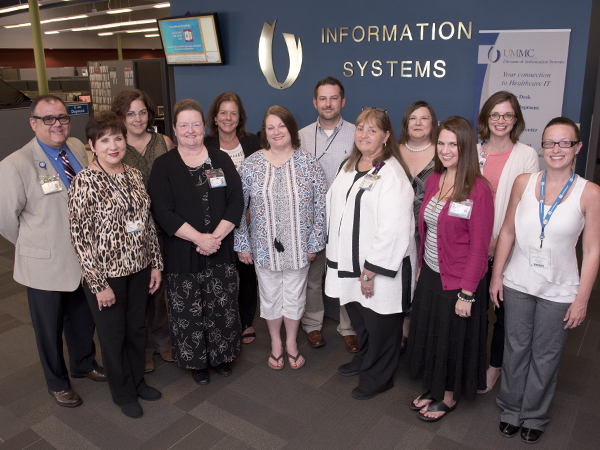
Most people are aware that the University of Mississippi Medical Center employs a lot of nurses - almost 2,000 - to provide patient care, but the 20-plus nurses who never see a patient face-to-face may be a surprise.
These nurses have set aside their stethoscopes for fast processors and computer keyboards to work behind the scenes, contributing to patient care from in front of computer screens.
They are the nurses of the Division of Information Systems, many of whom are on Epic teams, and their offices are located at the Jackson Medical Mall Thad Cochran Center. What they have in common is a love of nursing and technology.
Mary Craft, Epic nursing informatics specialist in the Department of Nursing Quality and Development, is a liaison between Epic (UMMC's electronic health record) and nursing services at the Medical Center. During her 30-year career, she has served as the “TB nurse” for the Hinds County public health department, as a home health-care nurse, as a nursing consultant, as a utilization review nurse and as a case manager at UMMC.
Craft said she has always had an affinity for technology. At one point in her career, her employer was a beta client for a new software vendor.
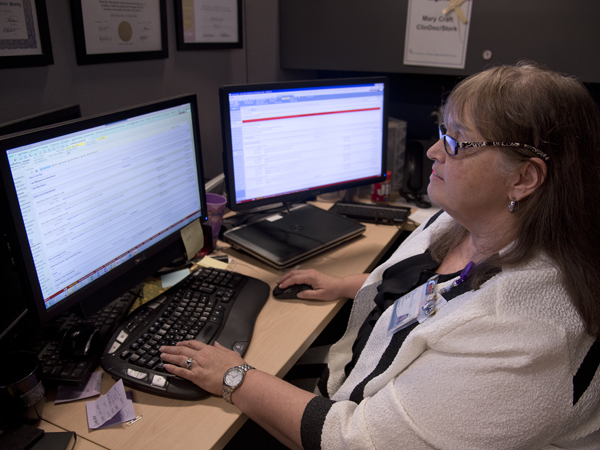
“I was able to spend a lot of time developing [the software],” Craft said. “What do you want it to say? What do you want it to look like? I saw the fun part of it.
“I kind of always had that tendency to the more technical side.”
Craft was a coordinated care manager at the Medical Center before electronic medical records became commonplace.
“The talk was that we were going with electronic medical records,” said Craft. “And since case management crosses all areas - it touches everything in the hospital - I was really interested in what the software would do.
“I said, 'I understand what needs to be documented, and I'd like to be on the other side to build that documentation.' So that's how I became part of the Epic team.”
The teams at the Medical Center include some whimsical monikers based on Epic Systems products, such as “ASAP” for the emergency department, “Radiant” for radiology, “Beaker” for labs, “Stork” for labor and delivery and “Willow” for pharmacy.
Craft is part of the clinical documentation team, or “ClinDoc,” which is responsible for information that clinical providers - doctors, nurses, physical therapists, social workers, residents and students, to name a few - are required to obtain from a patient at every visit.
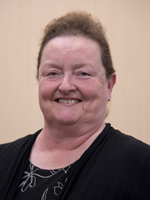
Debra Jones, a senior Epic analyst, has worked in DIS for almost four years but has been a nurse for 12. She worked as a floor nurse and in hospice before spending most of her nursing career in an ambulatory setting at an urgent care clinic.
“I went to nursing school later in life,” said Jones. “I had done some computer programming earlier on. I do have that background and a knack for working with computers.”
Jones was introduced to Epic by her daughter, who lived in Wisconsin - the location of Epic's corporate headquarters. Her daughter worked with the ASAP system in the emergency department of a small hospital that was a beta testing location for the software.
“My daughter wanted me to move up there,” Jones said. “There was an ambulatory analyst position open, and I applied and got it. That was my first nursing-related, DIS-type position.
“It is a better fit. I have the best of both worlds. I have experience from being a nurse and the computer background. I had a kidney transplant in 2009 - on my birthday - so patient care is probably not the best thing for me now.”

Kimberly Burley, an Epic optimization manager, began her nursing career in 2000 at Batson Children's Hospital. After two years on 4C, Burley spent some time as a travel nurse, working at Dartmouth-Hitchcock Children's Hospital in Manchester, New Hampshire; Lucile Packard Children's Hospital at Stanford in Palo Alto, California; and at Boston Children's Hospital in Massachusetts.
Having a father and a brother in computer science, Burley was around computers from the time she was little.
“That was before everyone had computers,” she said. “In college, I had a choice between computer science and nursing.”
After hearing a presentation on nursing informatics in her last semester of nursing school, Burley realized it was possible to have a career in both, but there were no nursing informatics programs available locally at that time.
Burley said she recognized the benefits computers offered health-care providers.
“I appreciated how much more efficient the electronic charting was for nurses,” she said.
As part of the optimization team, Burley works with specialties to make sure the Epic system is customized to meet the specific needs of each specialty.
“We have recently worked with neurosurgery, orthopaedics, vascular surgery and trauma,” she said. “We are with each of them for four weeks so they get focused attention for tools they need that other specialties might not. It might be something as simple as needing new note templates for documentation or questionnaires for patients.”

Trent Laird, also an enterprise optimization analyst, worked for 10 years as an ICU nurse, both locally and as a travel nurse to California, Missouri, Louisiana and Alabama. He moved “back home” in 2011 to take a position in short stay at the Medical Center.
“When we went live with Epic, I worked closely with the lead analyst and was an Epic super-user,” Laird said.
When he heard Epic team positions were available, Laird was hesitant to apply at first. Knowing that there were other nurses in analyst roles in DIS encouraged him to take that step. He said both roles involve critical and analytical thinking and a fast-paced environment with a lot of responsibility and autonomy.
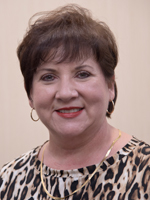
Zora Strickland, an Epic analyst since 2011 with OpTime/Optesia, the systems for surgery and anesthesia, began her nursing career in 1976. She was an OR nurse from 1981-94. During that time, the use of computers in health care was more rudimentary but was moving quickly toward today's tech emphasis.
“Back in '94, we had an OR manager who came from California. She wanted someone to start getting the preference cards off paper,” Strickland said. “I began loading the information from the paper cards into a stand-alone Microsoft computer.
“We are not going backwards. We are going to just keep improving as we go along.”

Phyllis Barr, whose nursing background is in oncology, has been an Epic analyst for almost six years.
“I became interested in the computer world through a scheduling product for nurses, back in the mid-to-late 90s,” Barr said. “Then there was a clinical order entry system where the physician would write the orders on paper, and the unit clerk would put the orders into the electronic system. As time and the computer system progressed, we added documentation for nurses, and after that we brought in physician order entry.
“I gradually grew less and less in the clinical world and more and more in the IT world. Informatics degrees didn't exist back then. We were on the cutting edge."
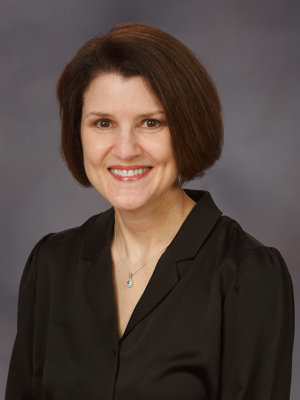
Today's nurses have more options than the Medical Center's technology pioneers. Dr. Lisa Morton, professor and chair of health informatics and information management in the School of Health Related Professions, said many of the students in the Master of Health Informatics and Information Management Program are nurses.
“There's such a huge demand for informaticists,” Morton said. “A number of our master's students have been hired for the Epic team here at the Medical Center.”
Morton said the bachelor's program is also attractive to registered nurses in the state who have an associate's degree and would like to become analysts. She said the benefit of having a nurse with the technical training is that they understand a clinician's workflow.
“Not only are they viewed by the user as a peer, but when the user says 'this is a real issue,' the nurse informaticists understands and can develop an ideal solution.”


